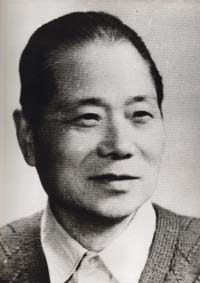Difference between revisions of "Du Renzhi"
imported>Ciic m (Created page with 'On Nov. 27, 1988, famous Chinese philosopher '''Du Renzhi''' died in Beijing because of sickness. He was 83. Du was born in Wanrong County, Shanxi province, and join...') |
imported>Ciic |
||
| (One intermediate revision by the same user not shown) | |||
| Line 1: | Line 1: | ||
On Nov. 27, 1988, famous Chinese philosopher '''Du Renzhi''' died in [[Beijing]] because of sickness. He was 83. | On Nov. 27, 1988, famous Chinese philosopher '''Du Renzhi''' died in [[Beijing]] because of sickness. He was 83. | ||
| + | |||
| + | [[File:Du Renzhi.jpg|thumb|200px|Du Renzhi]] | ||
Du was born in [[Wanrong County]], [[Shanxi]] province, and joined the [[Communist Party of China]] (CPC) in 1927. In order to seek truth of revolution, he went to study in Germany in 1929, coming back to [[Shanghai]] in 1933. Then, he was sent by the Shanghai Anti-Imperialist League to Shanxi to stir up anti-Japanese activities. In 1936, he and some progressives set up an allied group for saving the nation, and Du was chosen as a member of interim executive committee. | Du was born in [[Wanrong County]], [[Shanxi]] province, and joined the [[Communist Party of China]] (CPC) in 1927. In order to seek truth of revolution, he went to study in Germany in 1929, coming back to [[Shanghai]] in 1933. Then, he was sent by the Shanghai Anti-Imperialist League to Shanxi to stir up anti-Japanese activities. In 1936, he and some progressives set up an allied group for saving the nation, and Du was chosen as a member of interim executive committee. | ||
| Line 9: | Line 11: | ||
During the [[Cultural Revolution]], he was harassed and put into prison for more than six years. In prison, he vigorously denied the untrue charges imposed on him. After the downfall of the [[Gang of Four]], Du actively engaged in research work and took the position of vice chairman of the Sociological Research Association, vice chairman of the Political Science Research Association and chairman of the Chinese Society of Contemporary Foreign Philosophy without any regard to his physical discomfort or old age. | During the [[Cultural Revolution]], he was harassed and put into prison for more than six years. In prison, he vigorously denied the untrue charges imposed on him. After the downfall of the [[Gang of Four]], Du actively engaged in research work and took the position of vice chairman of the Sociological Research Association, vice chairman of the Political Science Research Association and chairman of the Chinese Society of Contemporary Foreign Philosophy without any regard to his physical discomfort or old age. | ||
| + | |||
Du's main works included "System of Confucianism," "Characteristics of Modern Western Philosophy," "On Subjective Initiative," "Issues about Modern Western Philosophy Research and Critical Methodology." He also edited the "Review of Modern Western Philosophers" and translated "The Age of Analysis, 20th Century philosophers." | Du's main works included "System of Confucianism," "Characteristics of Modern Western Philosophy," "On Subjective Initiative," "Issues about Modern Western Philosophy Research and Critical Methodology." He also edited the "Review of Modern Western Philosophers" and translated "The Age of Analysis, 20th Century philosophers." | ||
Du Renzhi was a member of the fifth and sixth [[CPPCC]]; a member of the third, fourth and fifth China Democratic League Central Commission; and a member of China Democratic League Central Consultative Committee. | Du Renzhi was a member of the fifth and sixth [[CPPCC]]; a member of the third, fourth and fifth China Democratic League Central Commission; and a member of China Democratic League Central Consultative Committee. | ||
[[category:people]] | [[category:people]] | ||
Latest revision as of 06:17, 27 November 2009
On Nov. 27, 1988, famous Chinese philosopher Du Renzhi died in Beijing because of sickness. He was 83.
Du was born in Wanrong County, Shanxi province, and joined the Communist Party of China (CPC) in 1927. In order to seek truth of revolution, he went to study in Germany in 1929, coming back to Shanghai in 1933. Then, he was sent by the Shanghai Anti-Imperialist League to Shanxi to stir up anti-Japanese activities. In 1936, he and some progressives set up an allied group for saving the nation, and Du was chosen as a member of interim executive committee.
After the War of Resistance Against Japan, he taught at Shanxi University while he organized many democratic movements with some progressive teachers and students.
In 1947, he joined the China Democratic League. Then, in 1948, he went to Peking and actively engaged in the Peaceful Liberation of Peking. In September 1949, Du came back to Shanxi and was appointed as a member of the People's Government of Shanxi and Financial and Economic Committee. In 1953, he became the director of the Commerce Office of Shanxi province. Du was later sent to the Chinese Academy of Sciences in 1956. In 1958, he launched and edited the "Collected Translations of Philosophy," which was later renamed as "World Philosophy."
During the Cultural Revolution, he was harassed and put into prison for more than six years. In prison, he vigorously denied the untrue charges imposed on him. After the downfall of the Gang of Four, Du actively engaged in research work and took the position of vice chairman of the Sociological Research Association, vice chairman of the Political Science Research Association and chairman of the Chinese Society of Contemporary Foreign Philosophy without any regard to his physical discomfort or old age.
Du's main works included "System of Confucianism," "Characteristics of Modern Western Philosophy," "On Subjective Initiative," "Issues about Modern Western Philosophy Research and Critical Methodology." He also edited the "Review of Modern Western Philosophers" and translated "The Age of Analysis, 20th Century philosophers."
Du Renzhi was a member of the fifth and sixth CPPCC; a member of the third, fourth and fifth China Democratic League Central Commission; and a member of China Democratic League Central Consultative Committee.
